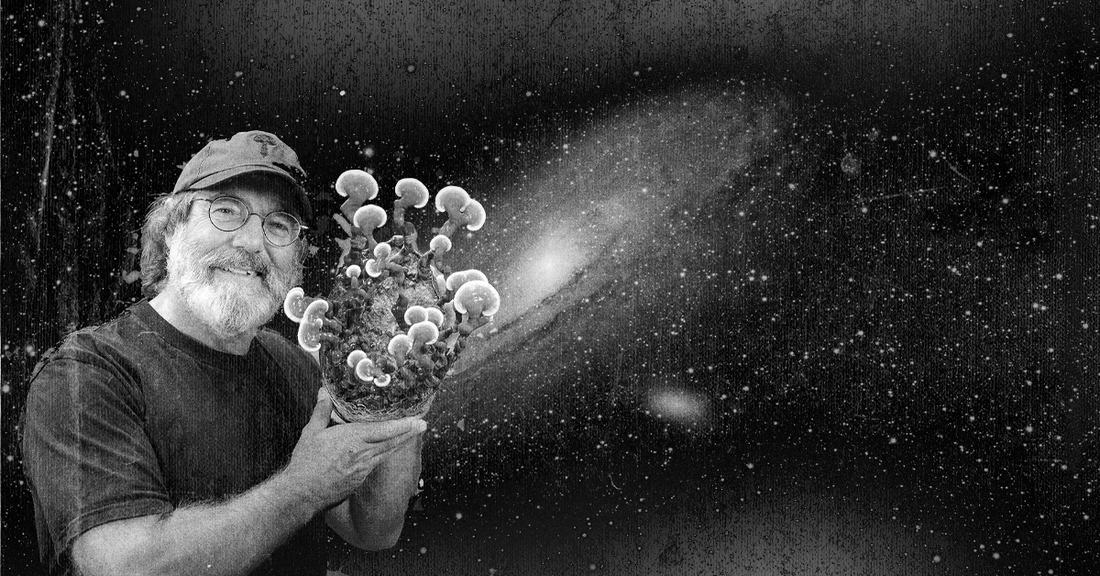To say that mushrooms are enjoying something of a renaissance would be an understatement. While they’ve of course been consistently popular in cuisine, until recently, many of their health benefits have been overlooked or restricted to the shadows. Today, however, a growing body of research supports the many physical and mental benefits offered by mushrooms. If you’re reading this, you’re likely familiar with much of that. One thing you might not know, however, is that mushrooms might have a major role to play in the future exploration of space.
Paul Stamets: The World’s First Astromycologist?
Recently, a press release on the renowned mycologist Paul Stamets’ website caught our attention. As it turns out, Stamets has begun collaborating with NASA on a project that could make fungi an integral aspect in humanity’s attempt to establish off-Earth settlements. According to the announcement, the program has two distinct stages.
The first stage involves determining which fungi would be best suited to help with the breakdown of regolith from asteroids. This regolith is essentially asteroid dust, and Stamets’ team hope that—with the help of fungi—it can be processed into healthy soil. This could be essential to terraforming extraterrestrial planets and establishing the environments necessary to grow food.
For Stamets, this is decades of work finally coming to fruition.
“It takes me way back,” he begins, “because in the 1980s I was involved with Space Biosphere Ventures. They built these domes for seven or eight humans inside who were supposed to then live in a closed ecosystem. I said, ‘Listen—you have to build up the carbon in the soil, you know? You’ve got to fill up the biosphere with a huge amount of debris, several feet deep, and [let it] decompose for three or four years before you begin.’ They didn’t like that concept—they were on a timeline. So we sort of had a falling out over that. Anyhow, I’ve been toying around with mushrooms in space for a long time, as a concept.”
Now, Stamets has brought these ideas to NASA and they’re seeing results.
“Oyster mushrooms are one of the best ones that we've experimented with on the regolith so far,” he says with evident pride. “Oyster mushrooms are just so talented, they grow on such a wide array of substrates.”
Stamets’ work in this field has earned him a uniquely stellar distinction: having a character named after him on “Star Trek: Discovery.”
“I’ve been a ‘Star Trek’ fan all my life,” Stamets explains. “I told them that they actually have a sort of a sacred mission: [To make] science fiction become science fact.”
The Emerging Field of Mycotecture
While that first stage might not be all that surprising—fungi has been useful for processing soil here on Earth forever—the second stage has much more of a sci-fi feeling to it. It involves developing fungi that will be used to grow structures on the moon and other planets; structures that will then be inhabited by our extraterrestrial pioneers. This emerging field has been deemed “mycotecture.”
Essentially, it works like this: Once a suitable fungi has been identified or developed (and according to Stamets, reishi mushrooms are presently a leading candidate), researchers will begin looking at how these strains can be “trained” to grow into structures. But why mushrooms in the first place?
First of all, it’s much easier and cheaper to bring a small amount of fungal material to space and “grow” structures, rather than rocketing up all the building materials, which would require a great deal of fuel and other resources. Second, researchers have found that blocks made out of reishi mushrooms are incredibly strong, making them outstanding for creating long-lasting structures in a harsh environment like space. They’re also great for heat insulation, and can potentially even be used as “batteries” in which to store energy.
Apparently, much progress has been made in stage two. Exactly how far they’ve gotten, however, is a bit of a mystery. For now, NASA are keeping their lips almost entirely closed on the project.
 Read more: Why Vets are Championing Psychedelic Decriminalization in California
Read more: Why Vets are Championing Psychedelic Decriminalization in California
In researching this article, we reached out to Lynn Rothschild, Ph.D., who is the head of the research program at NASA Ames in California. Lynn has been working on myco-habitat development for some time now.
“We are funded by the same program as Paul,” Rothschild explains, “but we are now in Phase II, which is a big deal. We have a lot of architects on our team, plus biologists and synthetic biologists such as myself.”
That is as far as NASA would allow that conversation to go. For now.
Fungi into the Final Frontier
Suffice to say that these are exciting times for mushroom enthusiasts. A lot of money and brainpower is going to these research projects, and so far they seem to be enjoying exciting results. It is increasingly looking like fungi will play an essential role in two key aspects of space exploration: How we grow our food, and where we live and work. It doesn’t get much more fundamental than that.
According to Stamets (in a separate interview conducted by this journalist for Scientific American), the value of mushrooms for space exploration might not end there. He also argues that psychedelic mushrooms should be used to help astronauts deal with the depression and anxiety that might arise from being isolated in space.
In other words, from the food that fuels our bodies, to the structures that protect us, to helping to keep our minds happy and healthy, mushrooms are an essential tool in humanity’s extraterrestrial toolbox.
Nick Hilden has written for Scientific American, the Daily Beast, the Los Angeles Times, Thrillist, Men’s Health, and more. You can follow his travels and writing on Instagram or Twitter.



